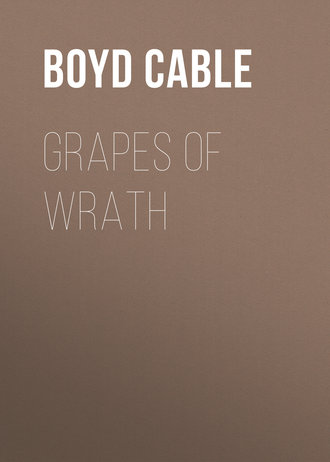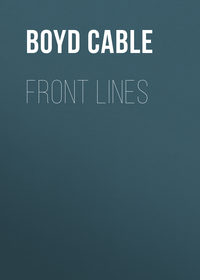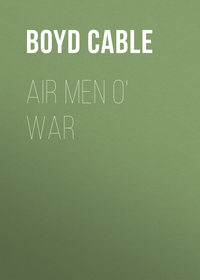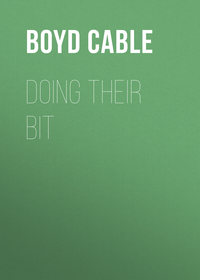
Grapes of wrath
Larry and Kentucky heard a call in the battery near them, the quick rush of running feet, a succession of sharp, shouted orders. The next instant, with a crash that made them jump, the six guns of the battery spoke with one single and instantaneous voice. In the momentary gush of flame from the muzzles, and of yellow light, that blotted out all other lights, the two men saw in one quick glimpse the hedge, the leafy screens above the guns, the guns themselves, and the gunners grouped about them. Out to their right, a moment after the darkness had flashed down again over the battery, a neighboring group of guns gave tongue in a rapid succession of evenly spaced reports. This other battery itself was hidden from the two watchers, but because of its nearness, the flashes from it also flung a blinding radiance upward into the night, revealing the outlines of every roof and building, hedge and tree, that stood against the sky.
Their own battery, in answer to a hoarse bellowing from the megaphone of “Section Fire – 5 seconds,” commenced to pound out a stream of shells from gun after gun. Away to right and left of them the other batteries woke and added their din to the infernal chorus. The shells from other and farther back batteries were rushing and screaming overhead, and dying away in thin wailings and whistlings in the distance.
Another and different note struck in, rising this time from a shrill scream to a louder and louder and more savage roar, and ending with an earth shaking crash and the shriek of flying splinters. A shell had burst a bare hundred yards from where the two stood, hurling some of its fragments over and past them to rap with savage emphasis on the stone and brick of the farm building.
Larry and Kentucky ducked hastily, and ran crouching to the corner of their barn, as another shrill whistle and rush warned them of the approaching shell. This time it burst farther off, and although the two waited a full fifteen minutes, no other shell came near, though along the crest of the sky-line they could see quick flashing burst after burst and thick, billowing clouds of smoke rising and drifting blackly against the background of light beyond the slope.
The tornado of shell fire beat the rifles down again to silence after some minutes. The rolling rifle fire and clatter of machine guns died away gradually, to no more than an occasional splutter, and then to single shots. After that the artillery slowed down to a normal rate of fire, a steady succession of bangs and thuds and rumblings, that, after the roaring tempest of noise of the past few minutes, were no more than comparative quiet.
“I’m glad we came out,” said Larry; “it was quite a decent little show for a bit.”
Kentucky peered at him curiously. “Did it strike you,” he said, “the number of guns there were loosing off in that little show, and that most of those the other side are going to be doing their darnedest to spoil our little show, when it comes the time for us to be over the parapet?”
“I suppose that’s so,” admitted Larry; “but then, you see, our guns will be doing the same by them, so the game ought to be even so far as that goes.”
“The game!” repeated Kentucky reflectively. “I notice quite a few of you boys talk of it as ‘a game,’ or ‘the game’; I wonder why?”
“I don’t know,” said Larry, “except that – oh, well – just because it is a game, a beastly enough one, I’ll admit, but still a game that the best side is going to win.”
“The best side – ” said Kentucky, “meaning, I suppose, you – us?”
“Why, of course,” said Larry, with utter and unquestioning confidence.
CHAPTER III
THE EDGE OF BATTLE
The men were awakened early next morning, and turned out, to find a gray, misty dawn. One might have supposed that in the mist it would have been impossible for the gunners to observe and direct any fire, but for all that the artillery on both sides were fairly heavily engaged, and the bangings and thumpings and rumblings rolled away to right and left, until they died down in the distance into the dull, muffled booming of a heavy surf beating on a long beach.
The Stonewalls breakfasted hastily on biscuits, cheese, jam, and tea, were formed up, and moved on to the road. They marched slowly up this in the direction of the front, and presently found the mist clearing away and then dispersing rapidly under the rays of the rising sun. It seemed as if the first beams of sunrise were a signal to the artillery, for the gunfire speeded up and up, until it beat in one long reverberating roar on the trembling air. The firing was not all from our side either; although for the moment none of the enemy shells dropped very close to the Stonewalls, there were enough of them sufficiently close to be unpleasantly startling, and to send their fragments whistling and whining over their hastily ducking heads.
About seven o’clock a new note began to run through the bellowing of the guns – the sharp, more staccato sound of the rifles and machine guns, the distinctive bang of bombs and hand-grenades. The rifle fire, hesitant and spasmodic at first, swelled suddenly to a loud, deep, drumming roll, hung there for several minutes, pitched upward again to a still louder tone, then sank and died away, until it was drowned out in the redoubled clamor of the guns.
The Stonewalls were halted and moved into the side of the road, and squatted lining the ditches and banks, listening to the uproar, discussing and speculating upon its meaning.
“Sounded like an attack, sure thing,” said Kentucky, “but whether our side is pushing or being pushed I have not a notion.”
“Probably ours,” said Larry; “the yarn was going that we were to attack this morning, although some said it was for tomorrow.”
“Anyway,” said Pug, “if our lot ’as gone over they’ve either got it in the neck, and ’ad to ’ook it back again, or else they’re over the No-Man’s-Land, and into the fust line.”
“That’s what,” said Billy Simson. “And ’ark at the bombs and ’and-grenades bustin’ off nineteen to the dozen. That means we’re bombin’ our way along the trenches and chuckin’ ’em down into the dugouts.”
It was true that the distinctive sound of the bursting bombs had risen again to a renewed activity, and from somewhere further up or down the line the rifle fire commenced again, and rose to one long, continuous full-bodied roar. The sound spread and beat down in rolling waves nearer and nearer, ran outward again on both flanks, continued loud and unceasing.
The Stonewalls were formed up and moved on again, and presently came upon, and marched into, the ruined fragments of a village, with shattered and tumble-down houses lining the sides of the road. They began to notice a new and significant sound, the thin whistling and piping of bullets passing high over their heads, the smack and crack of an occasional one catching some upper portion of the ruined houses past which they marched. Here, too, they began to meet the first of the backwash of battle, the limping figures of men with white bandages about their heads, arms, and bodies; the still forms at full length on the sagging, reddened stretchers. At one of the houses in the village a Red Cross flag hung limp over a broken archway, and through this the procession passed in an ever quickening stream.
The village street rose to the crest of a gentle slope, and when the Stonewalls topped the rise, and began to move down the long gentle decline on the other side, they seemed to step from the outer courts into the inner chambers of war. Men hung about the broken fragments of the buildings; ammunition carts were drawn up in angles and corners of the remaining walls; a couple of ambulances jolted slowly and carefully up the hill towards them; the road was pitted and cratered with shell holes; the trees, that lined both sides of it, trailed broken branches and jagged ends of smashed off trunks, bore huge white scars and patches, and strewed the road with showers of leaves and twigs. The houses of the village, too, on this side of the slope, had been reduced to utter ruin. Only here and there were two-or three-sided portions of a house still standing; the rest were no more than heaped and tangled rubbish-heaps of stone and brick, broken beams and woodwork, shattered pieces of furniture, and litter of red tiles.
By now the bullets were singing and whisking overhead, crackling with vicious emphasis against the trees and walls. And now, suddenly and without the slightest warning, four shells rushed and crashed down upon the road amongst the ruined buildings. The men who had been hanging about in the street vanished hastily into such cover as they could find, and the Stonewalls, tramping steadily down the shell-smashed, rubbish-strewn street, flinched and ducked hastily to the quick rush and crash of another string of shells. An order was passed back, and the column divided into two, half taking one side of the road, and half the other; the rear halting and lying down, while the front moved off by platoons, with some fifty to a hundred yards between each.
A German battery was evidently making a target of this portion of the road, for the shells continued to pound up and down its length. After the sharp burst of one quartette fairly between the ranks of a marching platoon, there was a call for stretchers, and the regimental stretcher-bearers came up at the double, busied themselves for a few minutes about some crumpled forms, lifted them, and moved off along the road back to the Red Cross flag of the dressing station. The shell-swept stretch of road was growing uncomfortably dangerous, and it was with a good deal of relief that the Stonewalls saw their leading platoon turn aside and disappear into the entrance of a communication trench.
“This ’ere,” said Pug, with a sigh of satisfaction, “is a blinkin’ sight more like the thing; and why them lazy beggars of a Staff ’aven’t ’ad this communication trench took back a bit further beats me.”
“It sure is a comfortable feeling,” agreed Kentucky, “to hear those bullets whistling along upstairs, and we safe down below ground level.”
The communication trench was very narrow and twisted, and wormed its way for an interminable distance towards the still constant rattle of rifle fire and banging grenades. The men had not the slightest idea what had happened, or what was happening. Some of them had asked questions of the stretcher bearers or of the wounded back in the village, but these it appeared had come from the support trenches and from the firing-line before the uproar of rifle fire had indicated the commencement of an attack by one side or the other. The long, straight, single-file line of Stonewalls moved slowly and with frequent checks and halts for over an hour; then they were halted and kept waiting for a good thirty minutes, some chafing at their inaction, others perfectly content to sit there in the safety of the deep trench. A few men tried to raise themselves and climb the straight sided walls of the trench to the level ground, but the long grass growing there still hid their view, and the few who would have climbed right out on to the level were sharply reprimanded and ordered back by the officers and N.C.O.s; so the line sat or stood leaning against the walls, listening to the unintelligible sounds of the conflict, trying to glean some meaning and understanding of the action’s progress from them.
The section of trench where Larry and his friends were waiting was suddenly overcast by a shadow, and the startled men, glancing hastily upward, saw to their astonishment a couple of Highlanders standing over and looking down upon them. One had a red, wet bandage about his head, the other his hose top slit down and dangling about his ankle, and a white bandage wound round the calf of his leg. The two stood for a minute looking down upon the men crouching and squatting in their shelter, on men too astonished for the moment to speak or do aught save gape upwards at the two above them. Somehow, after their relief at escaping from the open into the shelter of the trench, after the doubts and misgivings with which some of them had ventured to raise themselves and peer out above ground level, the angry orders given to them to get back and not expose themselves, after having, in fact, felt themselves for an hour past to be separate only from a sudden and violent death by the depth of their shelter trench, it took their breath away to see two men walking about and standing with apparent unconcern upon a bullet swept level, completely without protection, indifferent to that fact. But they recovered quickly from their amazement.
“Holloa, Jock,” Pug called up to them, “what’s the latest news in the dispatches? ’Ave we commenced the attack?”
“Commenced? Aye, and gey near finished, as far as we’re concerned.”
There was a quick chorus of questions to this. “How far had we gone?” “Was the first line taken?” “Was the attack pushing on?” “Had the casualties been heavy?” and a score of other questions.
The two Highlanders bobbed down hastily, as a heavy shell fell with a rolling cr-r-r-ump within a hundred yards of them.
“We’ve got the first line where we attacked,” said one of them after a moment, “and we’re pushing on to the second. They say that we have taken the second and third lines down there on the right, but the Huns are counter-attacking, and have got a bit of the third line back. I’m no’ sure what’s happened on the left, but I’m hearin’ the attack was held, and pretty near wiped out. I only ken that our lot is tryin’ to bomb up there to the left, and no’ makin’ much progress.”
His companion rose and stepped across the narrow trench.
“Come on, Andy,” he said, “we’ll awa’ back to the dressin’ station, and the first train to the North. This is no’ just a health resort to be bidin’ in. Good luck to you, lads.”
“Good luck, so long,” chorused the trench after them, and the two vanished from sight.
There was a buzz of excited talk after they had gone – talk that lasted until word was passed back along the trench and the line rose and commenced to stumble onward again.
“I suppose,” said Larry, “they’ll be moving us up in support. I hope we get out of this beastly trench soon, and see something of what’s going on.”
Billy Simson grunted. “Maybe we’ll see plenty, and maybe a bit too much, when we get out of here,” he said, “and it is decently safe down here anyhow.”
Pug snorted. “Safe?” he echoed; “no safer than it is above there, by the look of them two Jocks. They don’t seem to be worritin’ much about it being safe. I believe we would be all right to climb up out of this sewer and walk like bloomin’ two-legged humans above ground, instead of crawling along ’ere like rats in a ’Ampton Court maze of drains.”
But, whether they liked it or not, the Stonewalls were condemned to spend most of that day in their drains. They moved out at last, it is true, from the communication trench into one of the support trenches, and from this they could catch an occasional narrow glimpse of the battlefield. They were little the wiser for that, partly because the view gave only a restricted vision of a maze of twisting lines of parapets, of which they could tell no difference between British and German; of tangles of rusty barbed wire; and, beyond these things, of a drifting haze of smoke, of puffing white bursts of cotton wool-like smoke from shrapnel, and of the high explosives spouting gushes of heavy black smoke, that leaped from the ground and rose in tall columns with slow-spreading tops. They could not even tell which of these shells were friends’ and which were foes’, or whether they were falling in the British or the German lines.
Pug was frankly disgusted with the whole performance.
“The people at ’ome,” he complained, “will see a blinkin’ sight more of this show in the picture papers and the kinema shows than me what’s ’ere in the middle of it.”
“Don’t you fret, Pug,” said Larry; “we’ll see all we’re looking for presently. Those regiments up front must have had a pretty hot strafing, and they’re certain to push us up from the supports into the firing-line.”
“I don’t see what you’ve got to grumble about,” put in Billy Simson; “we’re snug and comfortable enough here, and personally I’m not in any hurry to be trottin’ out over the open, with the German Army shootin’ at me.”
“I admit I’m not in any hurry to get plugged myself,” drawled Kentucky, “but I’ve got quite a big mite of sympathy for Pug’s feelings. I’m sure getting some impatient myself.”
“Anyway,” said Pug, “it’s about time we ’ad some grub; who’s feelin’ like a chunk of bully and a pavin’-stone?”
The others suddenly woke to the fact that they also were hungry. Bully beef and biscuits were produced, and the four sat and ate their meal, and lit cigarettes, and smoked contentedly after it, with the roar of battle ringing in their ears, with the shells rumbling and moaning overhead, and the bullets piping and hissing and singing past above their trench.
After their meal, in the close, stagnant air of the trench they began to feel drowsy, and presently they settled themselves in the most comfortable positions possible, and dozed off to sleep. They slept for a good half hour, heedless of all the turmoil about them, and they were roused by a word passed down along the trench.
They rose, and shook the packs into place on their shoulders, tightened and settled the straps about them, patted their ammunition pouches, felt the bayonets slip freely in their scabbards, tried the bolts and action of their rifles, and then stood waiting with a curious thrill, that was made up of expectation, of excitement, of fear, perhaps – they hardly knew what. For the word passed along had been to get ready, that the battalion was moving up into the firing-line.
CHAPTER IV
ACROSS THE OPEN
The order came at last to move, and the men began to work their way along the support trench to the communication trenches which led up into the forward lines.
Up to now the battalion, singularly enough considering the amount of shelling that was going on, had escaped with comparatively few casualties, but they were not to escape much longer. As their line trickled slowly down the communication trench, Pug had no more than remarked on how cheaply they had got off so far, when a six-or eight-inch high-explosive shell dropped with a rolling crump, that set the ground quivering, close to the communication trench. The men began to mend their pace, and to hurry past the danger zone, for they knew well that where one shell fell there was almost a certainty of others falling. A second and a third shell pitched close to the other side of the trench, but the fourth crashed fairly and squarely into the trench itself, blowing out a portion of the walls, killing and wounding a number of men, and shaking down a torrent of loose earth which half choked and filled that portion of the trench. The communication ways, and, indeed, all trenches, are constructed on a principle of curves and zig-zags, designed expressly to localize the effect of a shell bursting in any one portion. Practically every man in this particular section of trench was either killed or wounded, but the rest of the line did not suffer. But the German gunners, having found their target, and having presumably observed their direct hit upon it, had their direction and range exactly, and they proceeded to pound that portion of the trench to pieces, and to make it a matter of desperate hazard for any man to cross the zone covered by their fire. The zone, of course, had to be crossed, the only other alternative being to climb out of the trench and run across the open until the further shelter was reached. There was a still greater hazard attached to this, for the open ground in this locality – as the officers knew – was visible to the German lines, and would expose the men, immediately upon their showing above ground, to a certain sweeping torrent of shrapnel, of machine-gun and rifle fire. So the portion of the battalion which was making its way down that communication trench was set to run the gauntlet of the smashed-in trench, and the shells which continued to arrive – fortunately – with almost methodical punctuality.
The procedure adopted was for the end of the line to halt just short of the fire zone, to wait there, crouched low in the bottom of the trench, until a shell had burst, then to rise and run, scrambling and climbing over the fallen débris, into the comparative safety of the unbroken trench beyond, until the officer who was conducting the timing arrangements thought another shell was due to arrive, and halted the end of the line to wait until the next burst came, after which the same performance was repeated.
Larry and his three chums, treading close on one another’s heels, advanced and halted alternately, as the leading portion of the line rushed across or stayed. They came presently to a turn of the trench, where an officer stopped them and bade them lie down, keep as close as they could, and be ready to jump and run when the next shell burst and he gave the word. The four waited through long seconds, their ears straining for the sound of the approaching shell, their eyes set upon the officer.
“Here she comes,” said Billy Simson, flattening himself still closer to the trench bottom.
They all heard that thin but ominously rising screech, and each instinctively shrank and tried absurdly to make himself smaller than his size.
“Just a-going to begin,” said Larry, with a somewhat forced attempt at lightness of tone.
“Don’t you wish you was a bloomin’ periwinkle,” said Pug, “with a bullet-proof shell?”
There was no time for more. The screech had risen to a rushing bellow, and the next instant the shell dropped with a tumultuous crash, and the air was darkened with a cloud of evil-smelling black smoke, thick, choking, and blinding dust. The four were dazed and shaken with the shock, half-stunned with the thunderclap of noise, and stupefied with the nearness of their escape. But the next instant they were aroused to hear the voice of the officer beside them, calling and shouting to them to get up, to go on, to hurry across.
“Get on!” repeated Pug, scrambling to his knees and feet. “My oath, get on. I wouldn’t stop ’ere if I ’ad an invitation to tea with the King ’imself.”
“Come, you fellows!” said Larry, and ran with his shoulders stooped, and closely followed by the other three, along a short, unbroken portion of the trench, out into where it was broken down and choked to half its height with the débris of fallen earth and stones. Over this the four clambered and scuffled hastily, to find the trench beyond it wrecked out of semblance to a trench, a tossed and tumbled shallow gutter, with sides fallen in or blown completely out, with huge craters pitting the ground to either side of it, with the black reek and thick dust still curling and writhing and slowly drifting clear from the last explosion. And in that broken welter were the fragments of more than earth or stone; a half-buried patch of khaki, a broken rifle, a protruding boot, were significant of the other and more dreadful fragments buried there.
Larry and the other three did not, to be sure, waste time upon their crossing, but, rapidly as they thought they were moving, they still managed to accelerate their pace as their ears caught the warning sound of another approaching shell, and within a few seconds of hearing its first sound, and the moment when it burst, they had rushed across the remaining portion of the fire-zone, had flung themselves down the sides of the last earth heap, leaped to their feet, and dashed breathlessly into the next unbroken portion of the communication trench. They did not attempt to halt there, but ran on panting and blowing heavily, their packs and haversacks scrubbing one side or the other of the trench, their heads stooped, and their shoulders rounded like men expecting a heavy blow upon their backs. This shell did not pitch into the broken ground where the others had blasted the trench out of any recognizable shape. It burst overhead with a sharp, ear-splitting crack, a puff of thick, yellowish-white smoke, a hail of bullets and flying splinters.
The four men instinctively had half-thrown themselves, half-fallen in the bottom of the trench. It was well they did so, for certainly not all of them could have escaped the huge piece of metal which had been the head of the shell, and which spun down the portion of trench they were in, with a viciously ugly whirr, to bury itself a couple of feet above the footway in the wall, where the trench twisted sharply. It struck close to Pug, so close indeed that when it hit the wall, and then by its own force, breaking down the earth, fell with it into the trench bottom, Pug was able to stretch out his hand and touch it. He gave a sharp yelp of pain and surprise as he did so, whipped his hand in again, and under his armpit.





